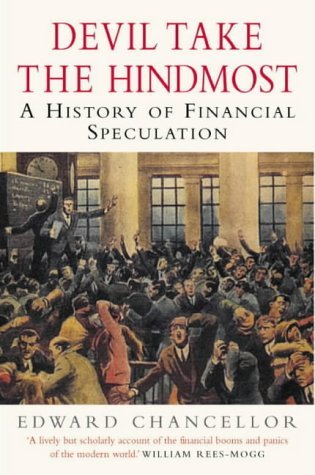Devil Take The Hindmost: A History of Financial Speculation - Softcover

"synopsis" may belong to another edition of this title.
Beginning with the "tulipomania" that gripped Holland in the 1630s, Chancellor chronicles the formations and irrational euphoria that can inflate markets, from shares of South Sea stock in England in the 1720s to real estate in Japan in the late 1980s. He characterizes the speculative spirit as one that
loves freedom, detests cant, and abhors restrictions. From the tulip Colleges of the seventeenth century to the Internet investment clubs of the late twentieth century, speculation has established itself as the most demotic of economic activities. Although profoundly secular, speculation is not simply about greed. The essence of speculation remains a Utopian yearning for freedom and equality which counterbalances the drab rationalistic materialism of the modern economic system with its inevitable inequalities of wealth.But it's precisely such inevitability that always seems to win out, when "sharply rising prices followed by sudden panic without cause" bring speculative excess to an abrupt end.
Chancellor makes Devil Take the Hindmost especially relevant to today's U.S. investors by using his analysis of past speculative manias as a lens through which to view the current bull-market binge. No matter what his or her current investment outlook is--bull or bear--anyone with capital to invest would do well to spend a thoughtful weekend with this book. Highly recommended. --Harry C. Edwards
Devil Take the Hindmost is an original and challenging history of stock-market speculation from the seventeenth century to the present day. Through vivid accounts of the speculative activities (wise and unwise) of investors ranging from Daniel Defoe and Benjamin Disraeli to Ivan Boesky and Hillary Rodham Clinton, Edward Chancellor shows that speculation is not driven solely by the desire to make money--by fear and greed--but springs from a wider range of human compulsions and aspirations.
Chancellor traces the origins of the speculative spirit back to ancient Rome and chronicles its revival in the modern world: from the Tulip Mania in Holland in the 1630s and the stock-jobbers in London's Exchange Alley at the end of the seventeenth century to the on-line "day-traders" of the information age.
Devil Take the Hindmost charts the development of speculation in the United States from the middle of the nineteenth century in chapters on Jay Gould and the Gilded Age, the Roaring Twenties, and the junkbond mania of the 1980s. According to Chancellor, the American passion for speculation derives from the notion's fierce competitiveness and appetite for risk. This is a source both of the nation's strength--as shown by the vibrant U.S. economy in the 1990s--and of its potential weakness, as the lessons of the Great Depression of the 1930s suggest.
A chapter on the 'bubble economy" of the 1980s shows how the anarchic force of speculation undermined the Japanese economic system; and in an epilogue, Chancellor examines contemporary arguments for and against speculation in light of the recent crisis at the Long-Term Capital Management hedge fund.
"About this title" may belong to another edition of this title.
- PublisherPapermac
- Publication date2000
- ISBN 10 0330484095
- ISBN 13 9780330484091
- BindingPaperback
- Number of pages400
- Rating
Shipping:
US$ 9.96
From United Kingdom to U.S.A.
Top Search Results from the AbeBooks Marketplace
Devil Take The Hindmost: A History of Financial Speculation
Book Description Condition: Good. Most items will be dispatched the same or the next working day. Seller Inventory # wbs5167367418

